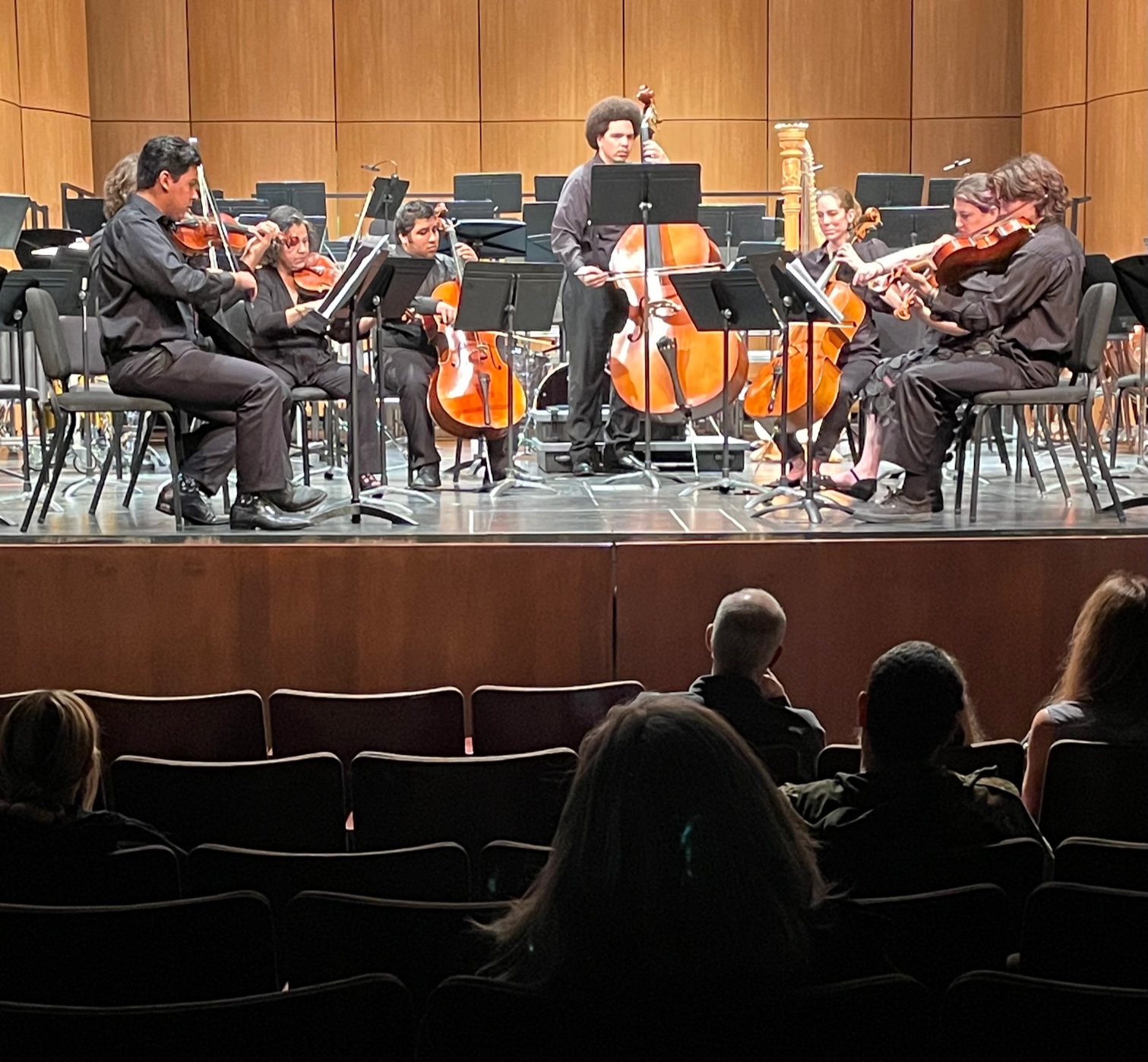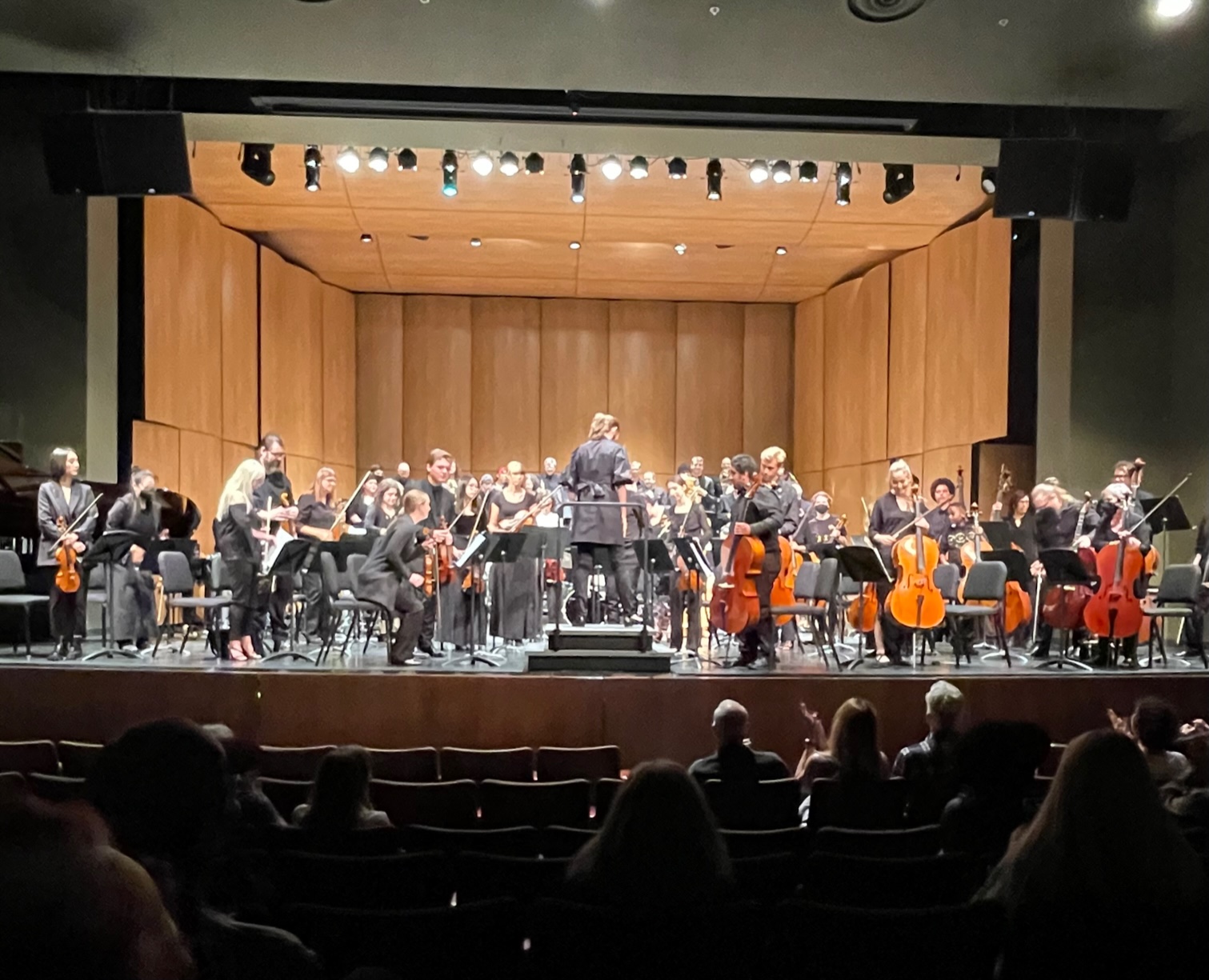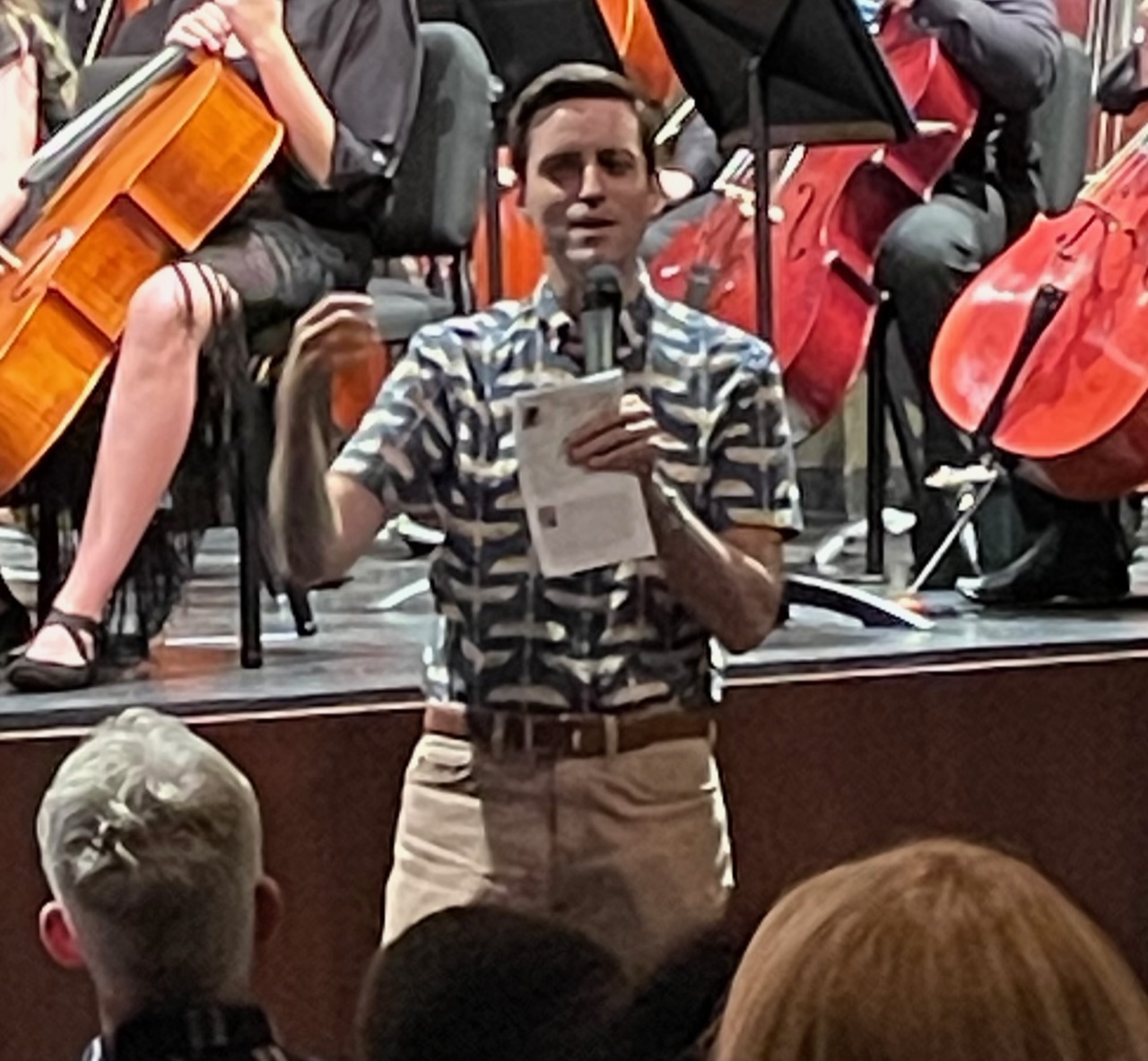
On May 14, 2023 the Ventura College Performing Arts Center was the venue for The Sounds of Springtime, a concert featuring the Ventura College Chamber and Symphony Orchestras. The program included music by Tchaikovsky, Duke Ellington and Aaron Copand. The highlight of the concert was a much-anticipated performance of Mariachitlán (2016) and the composer, Juan Pablo Contreras, was in attendance. Full disclosure – I was a member of the trumpet section of this orchestra in the early 1990s, so I was curious to see how they were getting along under the direction of Conductor Ashley Walters.
The Chamber Orchestra took the stage first, with the ensemble consisting of three violins, two violas, two cellos and a double bass. They performed all four movements of Serenade for Strings in C major (1880) by Pytor Ilyich Tschaikovsky, a piece familiar to many. Even though this was written in 1880, it owes much to the earlier classical style, especially in the first movement. The musicians produced a full sound, decently balanced, and the entry of the double bass invariably added a strong foundation for the harmony. The theme and variations in movement I were solidly played and were passed around smoothly between the different string sections. Movement II was in a moderate waltz tempo and this was successfully negotiated despite the separate lines weaving in and around each other.
Movement III was slower, and the playing nicely broad and smooth. The hall acoustic tended to swallow up the higher sounds and, once again, the entry of the bass strengthened the texture. A calming, hymn-like feeling was the result. The melody in this movement was often passed around to various players, and this was accomplished with confidence and continuity. The final movement began with a purposeful andante tempo and soft pitches in the upper strings. The other players entered gradually and the ensemble soon moved ahead with a faster tempo. Transitions in tempo are often problematic, but this was adroitly handled. At times, there were intricate stretches of bright pizzicato in the upper strings, a melody in the violas and a countermelody underneath in the cellos. The final phrases of the coda were suitably slow and grand, and made for a stirring finish. There is a lot of difficult music in Serenade for Strings, but the Chamber Orchestra was never overwhelmed or intimidated. A loud and long applause was heard at the end.
After a short intermission, the Symphony Orchestra took their places on stage. With 65 musicians, every section was fully manned and they filled the big stage from the risers in the back to the ample string sections arrayed out front. Their first piece was an arrangement of Duke Ellington tunes that included familiar favorites: Don’t Get Around Much Anymore, Sophisticated Lady and It Don’t Mean a Thing (If it Ain’t Got that Swing). The sound of the big orchestra filled the hall, with the brass and woodwinds fighting through from the risers in the back. The presence of the many strings covering the front of the stage gave a smooth sheen to the overall sound, adding a further elegance to the sophisticated Ellington style. The transitions between the tunes were efficiently managed and the rousing It Don’t Mean a Thing (If it Ain’t Got that Swing) at the finish was especially well received by the audience.
This was followed by Selections from Rodeo (1942), by Aaron Copland, and this included Saturday Night Waltz, Corral Nocturne and the iconic Hoe-Down. Right from the opening chords, the spacious Copland sound was front and center. The wide prairie and big sky feeling was especially aided by the string section. All of the familiar details were present and there were no shortcuts. Corral Nocturne was realized with broadly sustained tones and a quiet gentleness. The orchestra delivered all of the Copland style with a sound big enough to fill the hall and match the music. Hoe-Down was especially well done with the brass and woodwinds leading the way. Everyone has heard this piece many times, but the performance here was lively, loud and as convincing as any television commercial for the National Beef Council. Cheering and an enthusiastic ovation from the audience followed.

The final piece on the concert program was Mariachitlán (2016), by Juan Pablo Contreras. According to the program notes. Contreras is a “Latin GRAMMY nominated composer who combines Western Classical and Mexican folk music in a single soundscape.” Mariachitlán translates to Mariachi Land and is a portrayal of the music and the culture where it originated. This piece has proven to be very popular and has been performed by orchestras in Mexico, Latin America as well as in the southwestern US. Contreras worked with the Ventura College Orchestra during rehearsals and he was present at the concert to give a short introduction.

Contreras explained that mariachi music began in the Mexican state of Jalisco and is a widely practiced folk tradition. Even small towns and villages take pride in their mariachi music, and it is central to their celebrations and festivals. Mariachitlán brings to life the raucously goodnatured musical competitions typical of local mariachis, intent on displaying superior showmanship and joyful revelry. Contreras accomplishes all this through a 21st century musical language that is artfully composed with a pleasing, youthful exuberance and combined with a mature and masterful orchestration.
Mariachitlán opens with a loud blast of bright mariachi trumpets that immediately establishes an upbeat optimism. Skillful coordination and phrasing in the brass section propelled the piece forward. The rest of the orchestra joined in with strong tutti passages, brilliant solos, and dynamic energy throughout. Contreras manages to accommodate his strong affection for Mexican folk music within a distinctively contemporary musical syntax. This is a seemingly complex piece with a mix of familiar gestures and unusual techniques, but it never loses its boisterous charm. The Ventura College Orchestra gave a strong performance and clearly won over the audience for Mariachitlán, building new cultural bridges in the process.
Hearing this concert, it is clear that Conductor Ashley Walters has brought the Ventura College Music program to a high level of accomplishment. I will now stand up a bit straighter when I tell people I once played in the brass section there many years ago.
